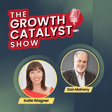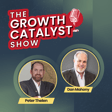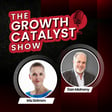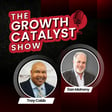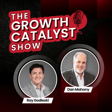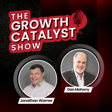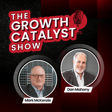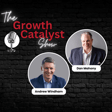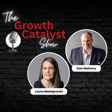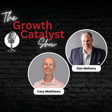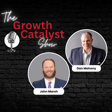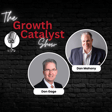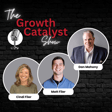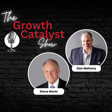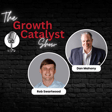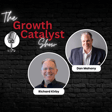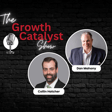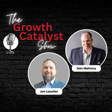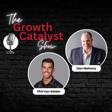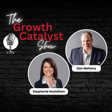Become a Creator today!Start creating today - Share your story with the world!
Start for free
00:00:00
00:00:01

Empowering Success: Jane Gentry's Unique Perspective on Business Growth and Transition
Jane Gentry, a renowned business consultant and CEO advisor, shares her business growth and change management expertise. Gain valuable insights into understanding market needs, fostering individual success, and navigating change through effective communication and empathy. Explore the secrets and strategies utilized by successful businesses and learn how to harness your potential for growth and transformation.
Transcript
Introduction and Guest Welcome
00:00:00
Speaker
Welcome to The Growth Catalyst Show, where we believe that growth can come in many forms, professional, personal, company, sales, you name it. I'm your host, Dan Mahoney, founder of Transcendent Sales Solutions and a guide to a world of growth possibilities. I've spent my career empowering companies and their people with strategies that accelerate growth.
00:00:18
Speaker
I'm here to bring you stories of these business leaders and their trusted advisors to gain insights into their journeys and learn how they fueled their own growth. Just maybe their journey could become part of your own growth story. Are you ready? Let's grow.
00:00:33
Speaker
Welcome to the next edition of The Growth Catalyst Show. I'm your host, Tam Honi, and I'm just excited to have my next guest here today. Jane Gentry is a visionary CEO of Jane Gentry & Company. With 30 years of success in leadership roles, business consulting, and executive coaching, Jane
00:00:50
Speaker
has been described as energetic and inspiring by her clients.
Jane's Professional Journey
00:00:54
Speaker
She founded her practice in 1999. She has helped businesses improve growth, profitability, client and employee retention, leadership skills, and overall business value. Jane, welcome to The Growth Catalyst Show. Thank you. Thank you for reading that bio by my mother. That makes me sound so smart.
00:01:11
Speaker
Oh my God, that is hilarious. Well, you know, you know, and you brought up your mother, you know, one of the things, and we've met on many occasions, one of my favorite meetings we had is talking about our Italian heritage a couple of years ago, right after the holidays and doing our Italian cookie exchange. That was one of my favorite meetings with you. Well, if you want to make it an annual thing, I'm in.
00:01:35
Speaker
We should cause you make cookies like my grandmother used to make them. Oh, that's so nice of you to say. Tell my mother that I got a thumbs up on my cookies. So, uh, that's great. It's just Italian mother gives you the thumbs up. It's a big deal. Yeah. Just the memories that day we shared doing that. That was so fun. Just the memories of watching our grandmothers teach us those things. And I think they're memories that live with us forever. So I miss my grandmother.
00:02:05
Speaker
as I do too.
Personal Anecdotes and Hobbies
00:02:07
Speaker
So I want to learn a little bit about Jane, I know, and I was doing my research today. So you went to Kent State University and the University of Pittsburgh. Are you from the Atlanta area? I'm an Air Force brat.
00:02:21
Speaker
So I ended up graduating high school in a suburb of Cleveland, Ohio. But no, I've lived, I moved every four years my entire life until I moved to Atlanta in 1992.
00:02:37
Speaker
So you were all over the place. So my only goal was to have my own washer and dryer and my own like deck or porch and what that was attached to. I didn't really care, but it'll take a crane to get me out of, out of the ATL, a crane out of the ATL. Well, um, yeah, I mean, and I mean, 92, I've been here since Oh six and God, how Lana is growing. You were here pre-Olympic too, which Atlanta was totally different back then.
00:03:04
Speaker
Yes, in the neighborhood I live in, the house I live in now doesn't even exist. I'm on my second house in the same neighborhood. Yeah, the part of the neighborhood I'm in doesn't even exist at that point when I moved here. I don't know if I should say this on your podcast, but somebody offered me a job last year to run a company for him and it was in Minnesota.
00:03:31
Speaker
And I said, man, I'm just so grateful for the offer. I appreciate you, but you did not have enough money or a man hot enough to get me to move to Minnesota. It's too damn cold there. It is too fricking cold. I'm never going back north. So yeah. Well, and one of the things I know about you too is you're a pickleball enthusiast.
00:04:00
Speaker
I am a pickleball enthusiast and I thought it was a stupid game for old people. And either I'm old now or I got over that bias. But a lot of young people, even in our neighborhood, play pickleball. Yeah, it's something I want to start because I don't have that. I used to play tennis when I was younger. I don't have the knees to play tennis anymore.
00:04:21
Speaker
Well, and just be careful, you can still get hurt playing pickleball. It's not, you know, you're not playing pickleball with your walker, you know, you can still get hurt, but yeah. The competitive nature of us, we can't give it up, right? I cannot, I can't do anything where my mind is not engaged and where there's not, you know, a W in the column at the end, you know?
00:04:49
Speaker
That's change entry. Yeah.
Founding Jane Gentry & Company
00:04:52
Speaker
So when you graduated university of Pittsburgh, I saw that you were in fine arts and then you went into the trade show industry. Yeah, I was an actor. My, uh, my training is in acting and music and dance. My, my master's degree is a, um, masters of fine arts in, in acting performance, which has served me much better than my father ever thought it would. And, uh,
00:05:20
Speaker
You know, I was hungry, Dan, like 1% of actors make a living acting.
00:05:26
Speaker
And I had paid my own way through school. I got a teaching assistantship and a full ride to grad school, but I still had student loan debt. And I went through the paper, if that tells you how old I am, and got a job in sales with an exhibit house. And those are companies that design and build and manage trade shows for corporations. And these guys manage for Bosch and Nike and
00:05:57
Speaker
Zenith, who I'm sure is around anymore, but a lot of big companies. And the VP of Sales said, Jane, sales is hard. People are not always honest with you about why they're not buying from you. You get rejected a lot. And I said,
00:06:15
Speaker
Have you ever gotten rejected because you're too cute or you're not cute enough or you sing in the wrong vocal range or you're too short for the male lead? And he looked at me and I said, think I can handle your rejection. I think I'll be okay. So that was my first job in the corporate world.
00:06:38
Speaker
So, and then fast forward with a couple jobs in the corporate world, you started Jane Gentry and company in 1998. 1999. You're, I don't know why I had 1998, but you are two or three months away from 25 years.
00:06:58
Speaker
Yeah, there's a break in there for running some companies. But yes, it's like you look back and you think, wow, how was I allowed to do that for that long? It's really a blessing. For the first almost 20 years,
00:07:21
Speaker
maybe not quite. I was in big companies. I was working in Coke and Home Depot and Philips and Mercedes. And if you're not from Atlanta, don't get all impressed with that. Because if you haven't worked at Coke and you live in Atlanta, you're probably not good at your job. If that's your target audience. I've never worked for Coke and I'm good for my job. That's not your target audience. So you're good.
00:07:46
Speaker
But I went and ran some companies in the experiential space, which includes trade shows. And I realized something about small and mid-sized businesses. And that is, obviously, they don't have access to the best practices you have in companies like Coca-Cola and Home Depot. But secondly, a lot of times, I think,
00:08:12
Speaker
Knit-sized companies don't know where to go to look for good and maybe don't know what good looks like when they find it or not. And aren't sure what they should pay for good. I found a lot of my clients have gotten ripped off by companies really overselling what they need and what they have to pay for that.
Business Growth Strategies
00:08:38
Speaker
the, uh, the owners of the companies that were owned by the equity group that I worked for all working again. So the other thing is, you know, I find in, well, let's just say a lot of clients bring us in for this. Some owners build their companies around income.
00:09:03
Speaker
and not around wealth. And what I mean by that is they're looking at their paycheck every month and they're looking at their bank account and they're thinking, man, this is a great business. But then they get exhausted and they want to get out.
00:09:16
Speaker
And their business is not necessarily built for wealth. It's not built around the value drivers that buyers care about. And so they're disappointed when they get a valuation that doesn't match up with what they think their company's worth. And the statistics around how many owners are unhappy with either being retired or the deal they got a year after getting out of their business is upwards of 90%.
00:09:47
Speaker
They don't think about the after. Well, yeah, I mean, the day you open your doors is really the day you should start thinking about selling your business. And yet we're about to onboard a client right now who's got five businesses. We're looking at helping him prep two of them and he wants out in 18 months. And we're looking, you know, we're going through these things and saying that
00:10:18
Speaker
you're not going to get the best valuation in 18 months because you haven't really thought of what your business needs to look like to sell it until this moment. And that's not uncommon.
00:10:33
Speaker
So the work you do with businesses, you're a business consultant, CEO, advisor. I mean, you have an extensive background in sales. Tell me kind of some of the work and you just mentioned the value blueprint, but some of the work that you're really doing for your clients and the value you're bringing to them.
00:10:50
Speaker
Well, I get I get invited in for maybe four things usually is the kind of the starting point Um, but maybe like you dan I find a lot of times that when a ceo invites us in and they think they have a problem I might not necessarily agree that that's the root cause of the problem or that that's the biggest problem so sometimes we
00:11:15
Speaker
with the buy-in of a CEO, maybe change our starting point. But usually, it's a growth problem. Not necessarily a sales problem, but a growth problem. I'm a client right now that wants to get from $40 million to $100 million in 5 years. They've been run like a little company.
00:11:39
Speaker
So that's a growth problem, right? Where do we start? How do we start building out process? Are we selling the right way? You know, those kinds of things. So it's either growth or M&A. We've purchased a bunch of companies or a company and we're not really sure how to integrate those companies together under one umbrella.
00:12:04
Speaker
We have a manufacturing client like that right now, bought three companies, merged them kind of poorly in the beginning, and the current CEO is now struggling with a lot of that. So we're really, in that case, some kind of a consigliere, we're kind of dividing and conquering what needs to be done in the organization. The third scenario is
00:12:30
Speaker
The CEO is about the loneliest job on earth, other than maybe President of the United States. People aren't truthful with you. You can't always be completely transparent with people.
00:12:45
Speaker
Hey, I don't know what the next thing is we're supposed to do, or I don't know how I'm going to make payroll this month. You need somebody to bounce things off of. I had a client say to me, I like that you poke holes in my thinking or help me validate my thinking. And I don't have anybody in the organization I can do that with.
00:13:06
Speaker
And then the last one is I want to get out in three to five years and I want the amount of money I get in my exit to equal the amount of sweat equity and sacrifice I've put into this business for 20 or 30 years. So it's usually that. And then, um,
00:13:31
Speaker
other things pop up, but that's usually the entree into a business for me or for our group.
Change Management Insights
00:13:39
Speaker
One of the things you mentioned earlier was your client that's going from 40 to a hundred million. And whether you're even four to 10 million or that number, I think everything that encompasses that is that change management piece, which we're going to document processes. We're going to do these things, but documenting your process through it is today is not necessarily going to get you from 40 to a hundred million. Talk about that. Cause that's the thing I see with the clients that is the hardest thing.
00:14:08
Speaker
Let's take a moment for a quick word from our sponsor. This episode of The Growth Catalyst Show was brought to you by Transcendent Sales Solutions. Whether your company is facing uncertainty, declining sales or resource limitations, Transcendent Sales has the solution. Their team has decades of experience helping businesses find alignment to meet their growth goals and transforming underperforming sales organizations into revenue producing market leaders.
00:14:32
Speaker
They take a hands-on, results-oriented approach to solving sales challenges. Visit TranscendenceSales.com to learn more and subscribe to the biweekly Growth Catalyst newsletter for insightful growth strategies. Transcendence Sales Solutions, empowering businesses to reach new heights. And now, back to the show.
00:14:50
Speaker
So I love that topic. I just talked in December to a group of CEOs about this exact topic. And I spoke I think last year, maybe a year and a half ago, I don't know, to HD supplies top 250 leaders about this exact topic. And I've had a lot of clients say to me,
00:15:13
Speaker
Oh, we're going to get by and we don't, we don't need to do that. I don't, I don't, I'm kind of said that to me right now and we're about to do a launch and we're going to see who's right, me or him, right? Um, that change management strategy and communication strategy is as important or more important as anything else you do. And I say to leaders, the one, the one thing leaders get wrong about change management,
00:15:41
Speaker
And I actually call it transition management because most leaders are not bad at change management. And I define that as the tactics of change, right? Here's where we're going. Here are the milestones. That's change management. Most leaders aren't terrible at that. It's the transition management, the people management that causes 70% of change initiatives to fail. And leaders say people don't like change.
00:16:10
Speaker
And I go, no, it's that's not true. It's not that people don't like change. People don't like loss. And what you're not addressing is what they're losing through the change and even the best change in your life. You know, if I won the lottery and built my dream home in Italy and left Atlanta, there's still a lot of loss that I'm going to experience in that amazing change in my life. Right.
00:16:37
Speaker
And people experience loss differently. People grieve things during a change process that seem frankly stupid to a leader. We don't understand it. We don't think it's logical. We think it's kind of dumb that that's what you're focused on. But leaders have to meet people where they are, right? And you have to understand
00:16:59
Speaker
how to communicate that change into the organization, when to communicate it, how to communicate it, how to get your leaders on board so you're all saying the same thing. And who do people trust the most in an organization?
00:17:15
Speaker
their direct manager. So if you don't have those people understanding the purpose of the change, what the end game looks like, how it's going to be better for everybody, and what everybody's individual role is going to be in that change, you're going to be one of those 70% statistics.
00:17:39
Speaker
Do you find the change management piece, if you look at the smaller company versus the mid to large size company, is it is it as painful? Sometimes I feel like the smaller company, it's even harder than the bigger company because of the layers, the lack of layers. It's the lack of layers. Right. And so, um,
00:17:58
Speaker
Yeah, I think it's like a CEO of a smaller company doesn't want to have to deal with that every day because they have bigger fish to fry. And yet you don't have bigger fish to fry because if this initiative doesn't work, what have you got to ask yourself? What have I wasted in terms of time, resources, right? And energy. And if you don't get the people on board, it's the people that affect the change.
00:18:29
Speaker
It's not the ERP system. It's not the new HR processes. It's not the new sales process. It's the people so if you don't get the people coming right along with it then every time you've spent on somebody like me or you Every amount of time you've spent working on this as opposed to some other thing you could be doing in your business It's just all a waste of energy
00:18:56
Speaker
You'd mentioned earlier, and I know your proprietary value
The Value Blueprint
00:19:01
Speaker
blueprint. Can you talk about some of the key components of that? I know it's around clarity, cadence, and continuity, correct?
00:19:09
Speaker
Yeah, it's also very much based on these value drivers that buyers look for because our goal anytime we're in a business for whatever reason is to make that business more valuable to a buyer. So the value blueprint looks at things like
00:19:29
Speaker
your finances. How do you look at the company financially? What do you measure in the company? Do you understand what buyers care about? A lot of owners look at EBITDA. EBITDA is important, but it's a metric. It's not even the only metric. We look at client mix. We look at a lot of the things that you are probably looking at and doing inside of a company.
00:19:55
Speaker
Do you have too many whales? Do you have too many minnows? Where's that middle bucket? How solidified are those clients in your organization? I had a client that sold a business recently and I kept saying, you have too many whales.
00:20:13
Speaker
don't worry about the little ones that those people are going to call you. We have to fill this middle bucket. Not only do you have too many whales, but your industry is changing dramatically. She thought she needed
00:20:31
Speaker
Oh, you know this person, right? She did one thing and what I said is you need a strategy. That's your most important problem right now is not sales. You need a new strategy because your business is changing so fast in about five minutes. What you do, is it going to be completely irrelevant to your customers and
00:20:54
Speaker
That's what ended up happening, right? So she lost some of these big clients to a new technology or a new way of them doing business that isn't that they did anything that she did anything wrong. She just wasn't prepared to meet the market where it was.
00:21:11
Speaker
that market conditions change.
Market Awareness and Success
00:21:13
Speaker
I mean, I used to work for Kodak at one time. They were holding onto that film until now. I don't even know if you can find Kodak anywhere.
00:21:26
Speaker
I don't know. Yeah, exactly. And they were one of the biggest companies in NASDAQ. They were a New York Stock Exchange, Darling, S&P 500. And they're just one of those examples, right? We could name 10 of those examples. Blockbuster.
00:21:46
Speaker
So understanding the market and buyers look at the market. You might have a really profitable organization, but if your market is sinking,
00:21:58
Speaker
then that's going to impact your valuation. So understanding what's going on in your market and getting your head up, you've got to kind of get through the sunroof of your company to look at what's going on in the industry. And we always say it's the hardest part of what we do is getting introductions to CEOs that are in our target audience. Why?
00:22:25
Speaker
because they are head down in their business. They're not out networking, they're not going to networking groups or anything, they are head down in their business. And that's great, but if you're so head down in your business that you're not paying attention to what's going on in your market, you're gonna be one of these stories like this client that we couldn't say. Working in the business versus on the business. Yes, that Jeffrey Gerber, I don't know if he coined that,
00:22:56
Speaker
It's a good, it's used very, and we see it all the time. You know, so in, in almost 25 years of business, I know you can, we could probably sit here for hours and talk about success stories, you know, thinking about, you know, a business in mind where, uh, where it all, it all lined up, uh, share, share some successes with us with some of the work you've done with a client. Um, you know, I,
00:23:22
Speaker
This is gonna sound odd. I don't focus on the success of the business as much as I focus on the success of the person. And when we're creating that growth of the person, then the business is gonna be successful. So let's just start with this manufacturing company that we're working with now. There are three divisional VPs and they run each a different
00:23:52
Speaker
profit center for the company. They're kind of different product lines, but their products are very bespoke for the most part.
00:24:04
Speaker
Seeing these guys look at the business differently, look at where the business comes from and rebuilding their strategy for how they're going to go to market based on where their business is coming from, based on where it should be coming from, making the comparison of those two things. What are the adjustments that we have to make? Is the organization structured to get us to where we need to go?
00:24:34
Speaker
The answer to that was pretty much no, right? So what should it look like? Who's the talent that we should have? How are we going to go get that talent? Seeing these guys have these aha moments and look at the business differently has created business success, but more importantly for me, it has created success for these guys, right?
00:25:00
Speaker
And it's kind of like a strategy of creating success for the individual creates success for the business. Does that make sense? Totally, totally. Yeah. Cause as a successful CEO or an executive is going to translate into a successful outcome with the company. And sometimes a successful CEO is a founder who gets to the point where he realizes
00:25:28
Speaker
I'm not the guy or I'm not the woman to get us to the next step. I have a client right now.
00:25:38
Speaker
that the founder said, I'm not the right person. I was the right person to get us here. I'm not the right person to get us to our next target and brought in somebody from Accenture to start running the company. I think that is one of the wisest CEOs I've worked with.
00:26:02
Speaker
because it's so unusual to see a CEO realize I'm not the person and really kind of set the ego aside and say, okay, I'm going to be the face in the industry. I'm going to be out in the industry, trying to understand what's going on and where we might serve the industry better, but I'm not the business person to get us to the next step.
00:26:25
Speaker
That's hard to say that when you're looking at the baby that you started. It is your baby, right? It is your baby. And so sometimes it's hard to separate your ego from your business and your love of your business, which is completely understandable.
Connecting with Jane and Conclusion
00:26:41
Speaker
Jane, you're a successful entrepreneur and you've built a great business. If someone's listening here today and wants to learn more about Jane Gentry and company, what's the best way to get ahold of you or contact you? JaneGentry.com.
00:26:55
Speaker
Jane M. Gentry on LinkedIn. Jane at Jane Gentry. Do you see a theme here, Dan? Jane at JaneGentry.com or 404-372-1417.
00:27:13
Speaker
And by the way, I mentioned this to you earlier, your website is amazing. I know you've put a lot of time into it and you did a great job. Anyone who wants to learn about Jane Gentry should go to JaneGentry.com because it is a fabulous site. So I'm going to give props to Myra on your behalf. Cause she's, she works hard on it. She did a great job. Jane. Thank you so much for taking the time to appear on the growth catalyst show. I really appreciate the insight you gave us today. I appreciate you.
00:27:58
Speaker
And that's a wrap for today's episode of The Growth Catalyst Show. Remember, you can take these stories of growth and make them part of your own journey. Learn from them, draw inspiration, and let them guide your path of growth. I'm your host, Dan Mahoney, and I look forward to our next journey together. If you've enjoyed the show, please subscribe and leave a review. Until next time, keep growing.
